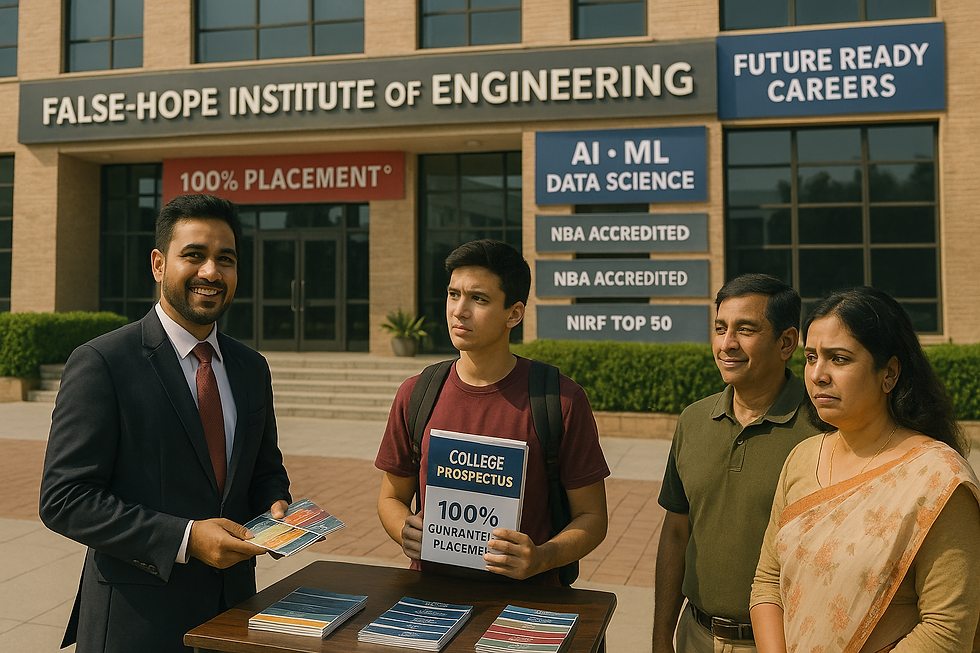When Professors Cheat: The Dark Tactics Used to Inflate Academic Prestige
- Dr. Deepessh Divaakaran

- Sep 3, 2024
- 3 min read
Academic fraud is a growing concern in the research community, where unethical practices can lead to serious consequences.

But how a faculty do the frauds?
This step-by-step scenario illustrates how some faculty members, under pressure to publish for Rankings, Accreditation and Reputation, might engage in fraudulent activities. By understanding these steps, we can better recognize and prevent such malpractice.
Step 1: Pressure to Publish
Imagine a university professor named Dr. Patel. He is under pressure to publish more research papers because it’s important for his career, promotions, and the reputation of his university.
Step 2: Contacting a Paper Mill
Dr. Patel hears about a company that can help him get papers published quickly. This company, known as a "paper mill," offers services to write papers or improve existing ones and promises to get them published in reputable journals. Dr. Patel contacts them and agrees to pay for their services.
Step 3: Creating or Modifying Paper
The paper mill either writes a completely new paper or modifies one of Dr. Patel's existing papers to make it look better. This often involves adding fake data, results, or even fake co-authors who didn’t contribute to the research.
Step 4: Bribing the Journal Editor
The paper mill then approaches a journal editor who is willing to bypass the normal peer-review process. This process is supposed to ensure that only high-quality and accurate research gets published. The editor might receive a bribe, such as money or other favors, to accept Dr. Patel’s paper without proper review.
Step 5: Paper Gets Published
Because the editor was bribed, Dr. Patel’s paper gets published quickly, even though it may contain false information or hasn’t been properly checked for quality.
Step 6: Consequences
Dr. Patel’s reputation improves because he has more published papers, but this comes at the cost of scientific integrity. If someone later finds out that his paper was part of this scheme, it could lead to retraction of the paper, damage to his career, and a loss of trust in the journal.
Step 8: Boasting on Social Media
After getting his paper published, Dr. Patel proudly shares his achievement on social media, highlighting the number of papers he has published. He might post things like "Another milestone achieved!" or "Proud to have published in top journals!" This chest-thumping draws attention and admiration from his colleagues, students, and even other faculty members who look up to him.
Step 9: Impact on Others
Many naive and inexperienced faculty members and students see Dr. Patel as a role model. Impressed by his apparent success, they start following his methods, hoping to replicate his achievements. Unfortunately, they don't realize that Dr. Patel's methods are unethical, and by following him, they might be led down a path that could harm their own careers and the integrity of academic research.
Step 10: Wider Impact
Such practices, if widespread, can harm the reputation of scientific journals, mislead other researchers, and ultimately damage the trust in scientific research as a whole.
This imaginary scenario highlights how the pressure to publish, combined with unethical practices like bribery, can lead to serious consequences in the academic world.
This scenario highlights how the pressure to achieve academic recognition can lead to a dangerous path of unethical behavior. It's a reminder that true academic integrity and success come from honest, rigorous research and adherence to ethical standards.
Don’t be mesmerized by someone’s quantity of publications, citations, or H Index. Focus on quality and be vigilant of such frauds. Also, do not come under false pressure of rankings and accreditation reputations.
Let’s stay committed to upholding the values that advance knowledge and trust in the academic community.
Disclaimer: The name "Dr. Patel" is used purely as a fictional example to illustrate potential unethical practices in academia. Any resemblance to real persons, living or dead, is purely coincidental.
For more information, please feel free to contact me in the order of my preference:
WhatsApp: +91 8086 01 5111
Email: mail@deepeshdivakaran.com
Phone: +91 8086 01 5111




Comments